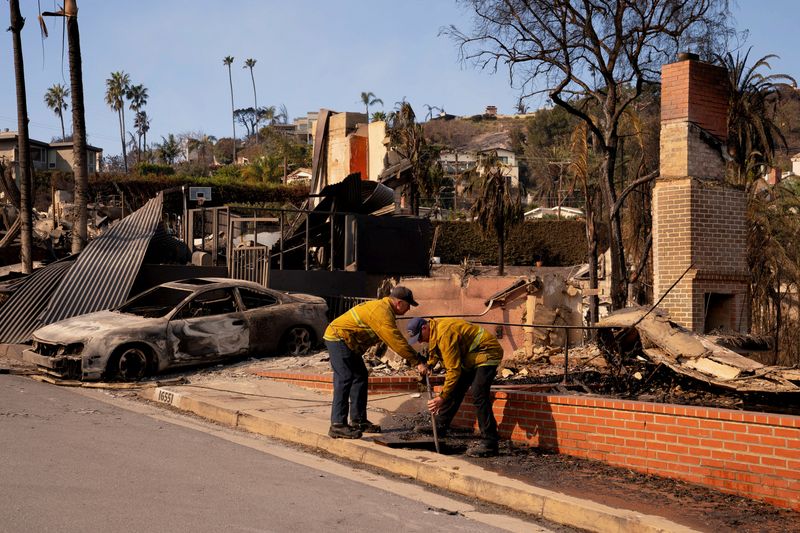By Jorge Garcia, Rollo Ross and Maria Alejandra Cardona
LOS ANGELES (Reuters) -Firefighters finally started gaining control over two major wildfires on the eastern and western flanks of Los Angeles on Friday as fierce winds that supercharged the fires for days finally eased.
Six simultaneous wildfires have devastated Los Angeles County neighborhoods since Tuesday, killed at least 11 people and damaged or destroyed 10,000 structures. Those totals are expected to grow once it is safe enough for firefighters to conduct house-to-house searches.
With thousands of people suddenly homeless and the thickening smoke leading U.S. officials to declare a public health emergency, firefighters reported progress arresting the Palisades Fire on the western edge of the city and the Eaton (NYSE:ETN) Fire in the foothills east of the sprawling metropolis.
After burning out of control for days, despite the efforts of hundreds of firefighters attacking the blazes from the air and on the ground, the Palisades Fire was 8% contained and the Eaton Fire 3%. Cal Fire had listed containment levels of both fires at 0% until Friday.
Even so, the two big fires combined had consumed 35,000 acres (14,100 hectares) – or 54 square miles, 2-1/2 times the land area of Manhattan.
Some 153,000 people remained under evacuation orders and another 166,800 faced evacuation warnings, with a curfew in place for all evacuation zones, Los Angeles County Sheriff Robert Luna said.
Seven neighboring states, the federal government and Canada have rushed aid to California, bolstering aerial teams dropping water and fire retardant on the flaming hills and crews on the ground attacking fire lines with hand tools and hoses.
“Thanks to the increased number of resources assigned, the region is in a much better posture than we were earlier this week,” Los Angeles County Fire Chief Anthony Marrone told a press conference.
Conditions in the Los Angeles area will improve through the weekend, with sustained winds slowing to about 20 mph (32 kph), gusting between 35 mph and 50 mph, according to the National Weather Service, a respite from recent wind gusts of 80 mph.
“It’s not as gusty, so that should help firefighters,” NWS meteorologist Allison Santorelli said, adding that conditions were still critical with low humidity and dry vegetation.
However, forecasters predicted another red flag warning would be issued for Monday.
HOMES REDUCED TO ASH
The psychological toll on a traumatized county of nearly 10 million people has yet to be assessed.
Pacific Palisades residents who ventured back to their devastated neighborhoods were shocked to find brick chimneys looming over charred waste and burnt-out vehicles as acrid smoke lingered in the air.
“This was a house that was loved,” Pacific Palisades resident Kelly Foster, 44, said while combing through the ashy rubble where her house once stood as smoke rose from neighboring homes and planes dropped water nearby.
Foster’s 16-year-old daughter, Ada, said she tried to get inside but “I just became sick. I just couldn’t even… Yeah, it’s hard.”
In Rick McGeagh’s Palisades neighborhood, only six of 60 homes survived, and all that remained standing at his ranch house was a statue of the Virgin Mary.
“Everything else is ash and rubble,” said McGeagh, 61, a commercial real estate broker, who along with his wife, raised three children at their home.
On Friday morning, hundreds of people streamed into a parking lot near the Rose Bowl stadium in Pasadena for donated clothing, diapers and bottled water.
Denise Doss, 63, said she was anxious to return to her destroyed home in Altadena to see if anything was salvageable, but officials stopped her due to safety concerns.
“At least to say goodbye until we can rebuild. I will let God lead me,” Doss said.
Many Altadena residents said they were worried government resources would go to wealthier areas and that insurers might short-change those who cannot afford to contest denials of fire claims.
Beyond those who lost their homes, tens of thousands remained without power, and millions of people were exposed to poorer air quality, as the fires lofted traces of metals, plastics and other synthetic materials.
BILLIONS IN LOSSES
Private forecaster AccuWeather estimated the damage and economic loss at $135 billion to $150 billion, portending an arduous recovery and soaring homeowners’ insurance costs.
California Insurance Commissioner Ricardo Lara called on insurers on Friday to suspend pending non-renewals and cancellations that homeowners received before the fires began and to extend the grace period for payments.

President Joe Biden has declared the fires a major disaster and said the U.S. government would reimburse 100% of the recovery for the next six months. In a call with Los Angeles Mayor Karen Bass and California Governor Gavin Newsom on Friday he reiterated his pledge to provide California with resources to fight the blazes and rebuild.
“This is not going to be over, even when all the fires are out, it’s just going to be beginning … so we’re going to be around a long while to help,” Biden told an Oval Office briefing.



